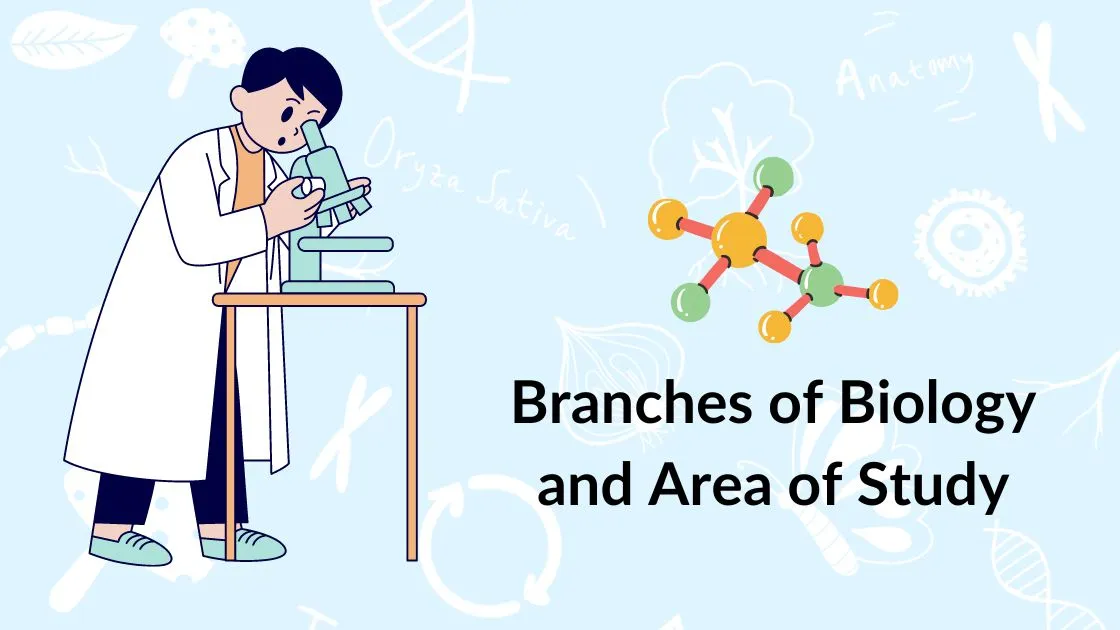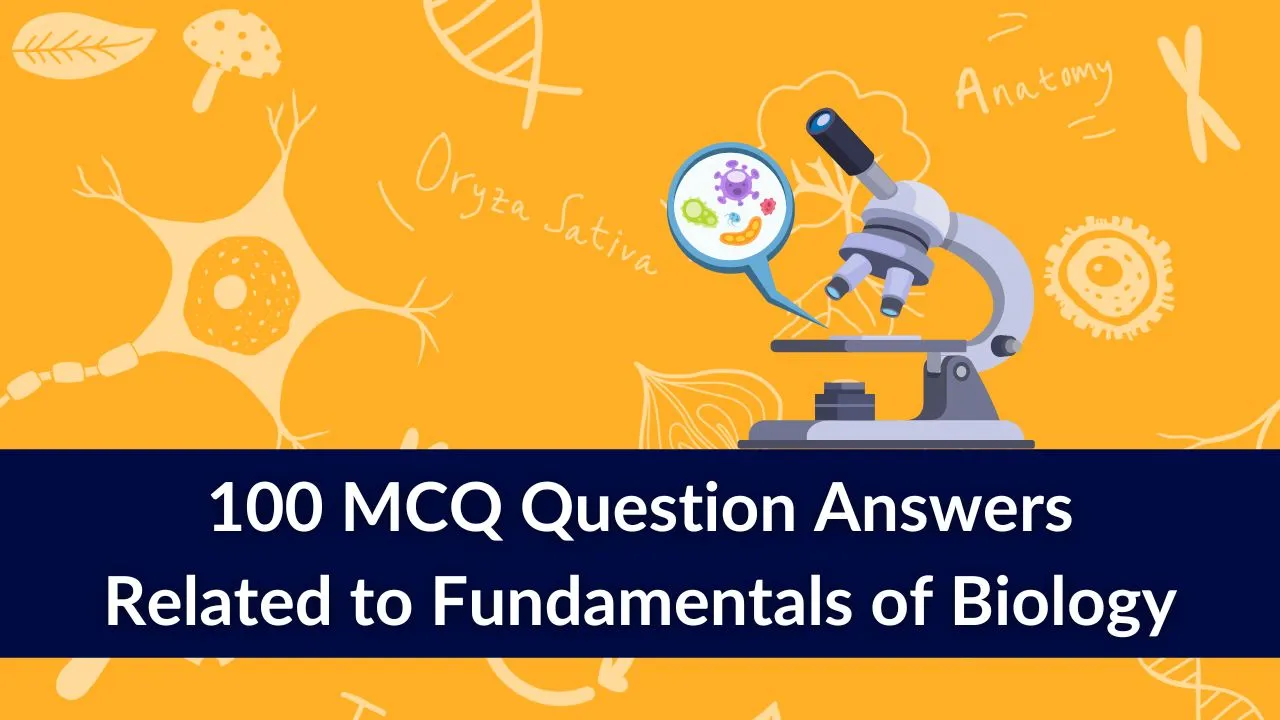100 GK Question Answers About Fundamentals of Biology
Welcome to Shiksha Press. In this post you will have an amazing Quiz on Fundamental Biology – Practice Test Questions for Final Exams. If you want the best biology related FAQs to practice for your final exam you can read this post containing 100 biology questions and answers.
These Multiple Choice Questions(MCQs on Biology) are specially made for practicing the Fundamentals of biology for the exams.
25 Most important Biology Multiple-Choice Questions (MCQs):
Explore the essentials of life science with these 25 crucial Biology MCQs, covering fundamental concepts and discoveries.
Question 1: What is the basic unit of life?
a) Heart b) Cell c) Leaf d) Atom
Question 2: Who is known as the Father of Biology?
a) Charles Darwin b) Aristotle c) Isaac Newton d) Albert Einstein
Question 3: What is the study of fungi called?
a) Entomology b) Ichthyology c) Mycology d) Herpetology
Question 4: Which process do plants use to make their own food?
a) Digestion b) Respiration c) Photosynthesis d) Fermentation
Question 5: What is DNA?
a) A protein b) A virus c) A carbohydrate d) A molecule carrying genetic instructions
Question 6: What does the term ‘biodiversity’ refer to?
a) The variety of life in the world b) The study of biological books c) The diversity of biotechnologies d) The biography of a biologist
Question 7: Which of the following is not a type of blood cell?
a) Red blood cell b) White blood cell c) Gold blood cell d) Platelet
Question 8: What is the name of the process by which cells divide?
a) Osmosis b) Mitosis c) Photosynthesis d) Transpiration
Question 9: Who proposed the theory of evolution by natural selection?
a) Gregor Mendel b) Charles Darwin c) Albert Einstein d) James Watson
Question 10: What is the function of the mitochondria?
a) Photosynthesis b) Protein synthesis c) Energy production d) DNA replication
Biology MCQ Quiz – Objective Question with Answer for Biology
Biology MCQ Quiz, featuring objective questions and answers to test and enhance your understanding.
Question 11: In which part of a plant does photosynthesis primarily occur?
a) Roots b) Stems c) Leaves d) Flowers
Question 12: What type of organism is commonly used as a model organism in genetics?
a) Drosophila melanogaster (fruit fly) b) Panthera leo (lion) c) Homo sapiens (human) d) Carcharodon carcharias (great white shark)
Question 13: What is the name of the bond between two water molecules?
a) Ionic bond b) Covalent bond c) Hydrogen bond d) Metallic bond
Question 14: Which kingdom includes mushrooms?
a) Plantae b) Fungi c) Animalia d) Protista
Question 15: Which organ is responsible for filtering and detoxifying the blood?
a) Heart b) Liver c) Stomach d) Lungs
Question 16: What is the term for a non-living factor in an ecosystem?
a) Biome b) Biotic c) Abiotic d) Eukaryote
Question 17: What is the main site for the synthesis of proteins within a cell?
a) Nucleus b) Ribosomes c) Golgi apparatus d) Endoplasmic reticulum
Question 18: Which vitamin is produced when the human skin is exposed to sunlight?
a) Vitamin A b) Vitamin B c) Vitamin C d) Vitamin D
Question 19: What is the scientific study of behavior and mental processes known as?
a) Sociology b) Psychology c) Anthropology d) Pathology
Question 20: Which gas is a byproduct of photosynthesis?
a) Oxygen b) Carbon dioxide c) Nitrogen d) Hydrogen
Biology FAQs – Interesting Questions and their Answers
Biology FAQs, providing insightful questions and answers on fascinating biological topics.
Question 21: What are the building blocks of proteins?
a) Nucleotides b) Amino acids c) Fatty acids d) Monosaccharides
Question 22: What type of blood vessels carry blood towards the heart?
a) Arteries b) Veins c) Capillaries d) Valves
Question 23: What is the name of the process by which green plants and some other organisms use sunlight to synthesize foods?
a) Cellular respiration b) Photosynthesis c) Fermentation d) Digestion
Question 24: Which part of the cell is responsible for controlling its activities?
a) Cytoplasm b) Cell wall c) Cell membrane d) Nucleus
Question 25: What is the term used to describe animals that can live both in water and on land?
a) Amphibians b) Reptiles c) Mammals d) Fish
Question Numbers and their Corresponding Answers for the Biology Quiz:
| Question Number | Correct Option | Answer |
|---|---|---|
| 1 | b | Cell |
| 2 | b | Aristotle |
| 3 | c | Mycology |
| 4 | c | Photosynthesis |
| 5 | d | A molecule carrying genetic instructions |
| 6 | a | The variety of life in the world |
| 7 | c | Gold blood cell |
| 8 | b | Mitosis |
| 9 | b | Charles Darwin |
| 10 | c | Energy production |
| 11 | c | Leaves |
| 12 | a | Drosophila melanogaster (fruit fly) |
| 13 | c | Hydrogen bond |
| 14 | b | Fungi |
| 15 | b | Liver |
| 16 | c | Abiotic |
| 17 | b | Ribosomes |
| 18 | d | Vitamin D |
| 19 | b | Psychology |
| 20 | a | Oxygen |
| 21 | b | Amino acids |
| 22 | b | Veins |
| 23 | b | Photosynthesis |
| 24 | d | Nucleus |
| 25 | a | Amphibians |
100 Frequently Asked Questions in Biology
Prepare for your biology final exam with our comprehensive set of 100 biology questions and answers. Explore the best biology-related FAQs and test your knowledge with specially crafted Multiple Choice Questions (MCQs). Master the fundamentals of biology through targeted practice for exam success.
100 frequently asked questions in Biology, offering in-depth explanations and insights into life’s diverse phenomena.
Question: What is Biology?
Answer: Biology is the scientific study of all living beings, including plants, animals, and humans.
Who is known as the Father of Biology?
Answer: Aristotle is known as the Father of Biology.
Question: What does Cytology focus on?
Answer: Cytology focuses on the structure and function of cells.
Question: Define Genetics in simple terms.
Answer: Genetics is the study of Question: How traits are inherited from one generation to the next.
Question: What is the purpose of Biotechnology?
Answer: Biotechnology uses living organisms to develop or make products.
Question: How did the invention of the microscope change Biology?
Answer: It allowed scientists to discover cells and understand their functions.
Question: What is the role of Taxonomy in Biology?
Answer: Taxonomy involves classifying and naming living organisms.
Question: What area does Physiology cover?
Answer: Physiology studies the functions and activities of living organisms.
Question: What is the main focus of Molecular Biology?
Answer: It focuses on biological processes at the molecular level.
Question: Why is Immunology important?
Answer: Immunology studies the body’s defense mechanisms against disease.
Question: What did Aristotle contribute to Biology?
Answer: He conducted detailed animal studies, laying the groundwork for zoology.
Question: What does Embryology examine?
Answer: Embryology examines Question: How embryos form and develop.
Question: What is studied in Marine Biology?
Answer: Marine Biology studies organisms living in oceanic environments.
Question: What does Ecology investigate?
Answer: Ecology investigates Question: How organisms interact with their environment and each other.
Question: What advancements does Biotechnology provide?
Answer: Biotechnology has led to advancements in medicine, agriculture, and industry.
Question: What is the significance of Bioinformatics?
Answer: Bioinformatics involves managing and analyzing biological data.
Question: What did the Cell Theory establish?
Answer: The Cell Theory established that all living things are composed of cells.
Question: How does Biology contribute to environmental conservation?
Answer: Biology helps us understand the relationships between organisms and their environments, guiding conservation efforts.
Question: What is Veterinary Science?
Answer: Veterinary Science is the medical care and treatment of animals.
Question: What aims does Eugenics have in Biology?
Answer: Eugenics aims to improve genetic qualities in humans.
Question: What does the study of Botany involve?
Answer: Botany involves studying plants, their structures, and processes.
Question: What is the significance of Zoology?
Answer: Zoology focuses on understanding animals and their biological processes.
Question: How does Bacteriology contribute to Biology?
Answer: Bacteriology studies bacteria, aiding in understanding and combating bacterial diseases.
Question: What is the importance of Virology?
Answer: Virology is crucial for studying viruses and finding ways to control viral diseases.
Question: Why is Mycology significant?
Answer: Mycology, the study of fungi, is essential for understanding fungal diseases and their ecological roles.
Question: What does Phycology study?
Answer: Phycology studies algae, important for ecological balance and research.
Question: What is the focus of Entomology?
Answer: Entomology focuses on the study of insects and their impact on the environment and human life.
Question: What is Ichthyology?
Answer: Ichthyology is the study of fish, important for environmental and biological research.
Question: What does Herpetology cover?
Answer: Herpetology covers the study of reptiles and amphibians.
Question: Why is Ornithology important?
Answer: Ornithology, the study of birds, contributes to ecological balance and biodiversity research.
Question: What is Anatomy in Biology?
Answer: Anatomy is the study of the physical structure of organisms.
Define Morphology in a biological context.
Answer: Morphology in biology refers to the study of the forms and structures of organisms.
Question: What is Histology?
Answer: Histology is the study of the microscopic structures of tissues.
Question: How does Physiology help humans?
Answer: Physiology helps in understanding Question: How the body functions, aiding in medical practices.
Question: What does Embryology teach us?
Answer: Embryology teaches us about the development of organisms from fertilization to birth.
Question: Why is Taxonomy crucial in Biology?
Answer: Taxonomy helps in organizing and classifying organisms, making it easier to study them.
Question: How does Ecology affect our lives?
Answer: Ecology affects our lives by sQuestion: Howing Question: How we interact with our environment and other organisms.
Question: What is the study of Biogeography?
Answer: Biogeography is the study of the distribution of species and ecosystems in geographic space and through geological time.
Question: Why is Palaeontology important?
Answer: Palaeontology, the study of ancient life, helps us understand the Earth’s history and evolutionary processes.
Question: What does Evolution study?
Answer: Evolution studies the changes in living organisms over time.
Question: What is Parasitology?
Answer: Parasitology is the study of parasites and their interactions with their hosts.
Question: Why is Pathology important in Biology?
Answer: Pathology helps understand diseases, their causes, and effects on the body.
Question: What does Immunology help us combat?
Answer: Immunology helps us combat diseases by understanding the immune system.
Question: How does Biochemistry impact Biology?
Answer: Biochemistry helps us understand the chemical processes within living organisms.
Question: What role does DNA fingerprinting play in Biology?
Answer: DNA fingerprinting is crucial for genetic analysis, forensics, and understanding heredity.
Question: How does Agriculture benefit from Biology?
Answer: Biology improves agriculture through genetic engineering, pest control, and understanding plant diseases.
Question: What is Apiculture and Question: Why is it important?
Answer: Apiculture, or beekeeping, is important for honey production and pollination services.
Question: Why is Veterinary Science crucial?
Answer: Veterinary Science is crucial for animal health, which impacts food safety and public health.
Question: What do we learn from Marine Biology?
Answer: Marine Biology teaches us about marine ecosystems, organisms, and their conservation.
Question: What is Household Biology?
Answer: Household Biology involves studying domestic animals and pests, improving home hygiene and safety.
Question: How does Horticulture benefit society?
Answer: Horticulture improves food supply, aesthetics, and environmental quality through the cultivation of plants.
Question: Why is Sericulture significant?
Answer: Sericulture, or silk farming, is significant for the textile industry and economic development.
Question: What does Pisciculture involve?
Answer: Pisciculture involves breeding and raising fish for food and restocking.
Question: How does Molecular Biology impact medical science?
Answer: Molecular Biology leads to medical breakthroughs in disease treatment and genetic understanding.
Question: What advancements has Cloning brought?
Answer: Cloning has brought advancements in genetics, agriculture, and medical research.
Question: Why is Bioengineering important?
Answer: Bioengineering is important for developing medical devices, artificial organs, and new biotechnologies.
Question: What does Nuclear Biology study?
Answer: Nuclear Biology studies the effects of radiation on living organisms.
Question: How does Space Biology contribute to science?
Answer: Space Biology explores the effects of space environments on living organisms.
Question: What is Exobiology?
Answer: Exobiology, or astrobiology, studies the possibility of life beyond Earth.
Question: What does Genomics involve?
Answer: Genomics involves analyzing and understanding an organism’s complete genetic material.
Question: How does Bioinformatics benefit Biology?
Answer: Bioinformatics allows for the storage, retrieval, and analysis of biological data.
Question: What is Biometrics used for?
Answer: Biometrics is used for identification and security through biological data.
Question: How does Biology foster an appreciation for nature?
Answer: Biology reveals the complexity and beauty of nature, fostering respect and appreciation.
Question: Why is understanding diseases important?
Answer: Understanding diseases helps in their prevention, treatment, and eradication.
Question: How does Biology help in food production?
Answer: Biology helps increase food production through breeding, pest control, and crop management.
Question: What is the role of Biology in public health?
Answer: Biology plays a critical role in improving sanitation, controlling diseases, and promoting health.
Question: How does Biology help in environmental conservation?
Answer: Biology guides the sustainable management of natural resources and conservation of biodiversity.
Question: Why is pollution a concern for Biologists?
Answer: Pollution affects ecosystems, human health, and biodiversity, making its study and control crucial.
100 Fundamental Questions in Biology for Final Exams
Question: How does Biology relate to careers in health and medicine?
Answer: Biology provides the foundational knowledge for careers in healthcare, research, and medical diagnostics.
Question: What is the role of Biology in genetics and heredity?
Answer: Biology explains the mechanisms of genetics and heredity, impacting medical, agricultural, and environmental fields.
Question: How does Biology contribute to the understanding of ecosystems?
Answer: Biology helps us understand the dynamics and interdependence of organisms within ecosystems.
Question: Why is the study of animal behavior important?
Answer: Studying animal behavior helps in understanding ecological balances, animal welfare, and evolutionary processes.
Question: How does Biology impact agriculture?
Answer: Biology impacts agriculture by improving crop varieties, pest control, and soil management.
Question: What is the importance of water quality in Biology?
Answer: Water quality is crucial for ecosystem health, human consumption, and agricultural use.
Question: How does Biology address climate change?
Answer: Biology studies the impacts of climate change on organisms and ecosystems, guiding mitigation and adaptation strategies.
Question: Why is biodiversity important in Biology?
Answer: Biodiversity is vital for ecosystem resilience, genetic resources, and human well-being.
Question: How does Biology help in disease prevention?
Answer: Biology identifies disease causes and transmission, leading to effective prevention and control measures.
Question: What is the significance of plant studies in Biology?
Answer: Plant studies are significant for understanding photosynthesis, ecology, and food supply.
Question: How does animal physiology contribute to medical research?
Answer: Animal physiology contributes to understanding human diseases, drug testing, and medical treatments.
Question: Why is the study of life cycles important in Biology?
Answer: Studying life cycles helps in understanding organism development, population dynamics, and ecological roles.
Question: How does Biology help in waste management?
Answer: Biology helps in developing biological waste treatment and recycling processes.
Question: What is the role of Biology in renewable energy?
Answer: Biology contributes to renewable energy through biofuels and biological solar energy research.
Question: How does Biology influence public policies?
Answer: Biology influences policies on health, environment, and resource management based on scientific evidence.
Question: Why is the study of genetics crucial for agriculture?
Answer: Genetics is crucial for breeding disease-resistant, high-yield crops.
Question: What does Biology teach us about life’s diversity?
Answer: Biology teaches us about the vast diversity of life forms and their evolutionary connections.
Question: How does Biology help in understanding human anatomy?
Answer: Biology provides insights into human body structure and function, essential for medicine and health.
Question: Why is the study of microorganisms important?
Answer: Studying microorganisms is important for understanding disease, ecology, and biotechnology applications.
Question: How does Biology contribute to nutrition science?
Answer: Biology contributes to understanding nutritional needs, food sources, and diet impacts on health.
Question: What role does Biology play in pharmaceutical development?
Answer: Biology is fundamental in identifying medicinal compounds and developing drugs.
Question: How does the study of ecosystems contribute to environmental protection?
Answer: Studying ecosystems helps in conservation efforts and understanding human impacts on the environment.
Question: Why is the study of cell biology fundamental?
Answer: Cell biology is fundamental for understanding life at its most basic level, influencing health and disease research.
Question: How does Biology assist in global health initiatives?
Answer: Biology underpins global health initiatives by providing insights into disease patterns and treatment strategies.
Question: What is the significance of studying animal and plant interactions?
Answer: Studying interactions helps in understanding ecological balance and the importance of biodiversity.
Question: How does Biology help in understanding the aging process?
Answer: Biology provides insights into the biological mechanisms of aging and strategies for healthy aging.
Question: Why is conservation genetics important?
Answer: Conservation genetics is important for preserving genetic diversity and protecting endangered species.
Question: How does Biology inform climate adaptation strategies?
Answer: Biology informs adaptation strategies by studying Question: How organisms respond to climate changes.
Question: What is the role of Biology in food security?
Answer: Biology plays a crucial role in ensuring food security through sustainable agricultural practices and biotechnologies.
Question: Why is understanding the human genome important?
Answer: Understanding the human genome is important for medical research, disease prevention, and personalized medicine.
Question: How does Biology contribute to sustainable development?
Answer: Biology contributes to sustainable development by providing solutions for environmental, health, and agricultural challenges.
Question: What is the future of Biology in addressing global challenges?
Answer: The future of Biology lies in solving global challenges such as disease, food scarcity, and environmental degradation.
What are the Branches of Biology and Area of Study?

Some Branches of Biology along with their areas of study:
| Branch of Biology | Area of Study |
|---|---|
| Botany | The study of plants. |
| Zoology | The study of animals. |
| Human Biology | The study of humans and their relationship with other living organisms. |
| Bacteriology | The study of bacteria. |
| Virology | The study of viruses. |
| Mycology | The study of fungi. |
| Phycology/Algology | The study of algae. |
| Entomology | The study of insects. |
| Ichthyology | The study of fishes. |
| Herpetology | The study of reptiles and amphibians. |
| Ornithology | The study of birds. |
| Anatomy | The study of the structure of organisms. |
| Morphology | The study of the form and structure of organisms. |
| Histology | The study of tissues. |
| Cytology | The study of cells. |
| Physiology | The study of the functions of organisms and their parts. |
| Embryology | The study of the development of embryos. |
| Taxonomy | The science of classifying organisms. |
| Ecology | The study of organisms and their environment. |
| Biogeography | The study of the distribution of species. |
| Palaeontology | The study of prehistoric life. |
| Evolution | The study of the origin and changes in species. |
| Genetics | The study of heredity and variation in organisms. |
| Parasitology | The study of parasites. |
| Pathology | The study of disease. |
| Immunology | The study of the immune system. |
| Eugenics | The study of improving genetic qualities. |
| Biochemistry | The study of chemical processes within living organisms. |
| Molecular Biology | The study of biological activities at a molecular level. |
| Biotechnology | The application of technology to biological processes. |
| Bioengineering | The application of concepts to biological systems. |
| Nuclear Biology | The study of the effects of radioactivity on living things. |
| Space Biology | The study of living things in space environments. |
| Exobiology | The study of life beyond Earth. |
| Genomics | The study of genomes. |
| Bioinformatics | The analysis of biological information. |
| Biometrics | The study of statistical analysis in biological data. |
We Hope that These Fundamental Biology – Practice Test Questions in Final Exam helped you in preparation of your exams.
Biology contains many interesting topics like this. We should practice more and more Frequently Asked Questions in Biology to give our best in the Final Exams.
Practicing Biology FAQs and Exploring Interesting Questions and their Answers for different topics could help you in knowing more about Biology. These help in expanding knowledge for different topics and subjects.
Biology MCQ Quiz – Objective Question with Answer for Biology help students learning more about the fundamentals of biology. MCQs play important role in testing the knowledge of students.
MCQs on Biology provide different confusions hence, it affects the learning and answering way of the students.






